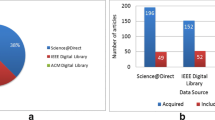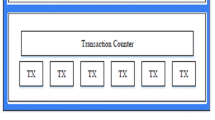Abstract
Many people have used public keys in various areas based on public key infrastructure (PKI). PKI provides a method to publicize public keys securely. However, existing PKI methods have a problem that they assume trusted third parties. Therefore, the existing PKIs cannot be used when users cannot trust certificate issuers. To solve this problem, we propose a new trust model and describe its implementation based on blockchain. Users can trust the certificate issued by full nodes even if they do not trust the full nodes themselves. We analyze the security of our model and show that its security can be achieved higher than existing models. This new model can be particularly useful in an environment where a third party cannot be easily trusted.











Similar content being viewed by others
References
Public key infrastructure. Wikipedia. https://en.wikipedia.org/wiki/Public_key_infrastructure. Accessed 22 Aug 2018
Cooper D, Santesson S, Farrell S, Boeyen S, Housley R, Polk W (2008) Internet X. 509 public key infrastructure certificate and certificate revocation list (CRL) profile. Technical Report. https://tools.ietf.org/html/rfc5280. Accessed 22 Aug 2018
Abdul-Rahman A (1997) The pgp trust model, EDI-forum. J Electron Commer 10:27–31
Fromknecht C, Velicanu D, Yakoubov S (2014) CertCoin: a namecoin based decentralized authentication system 6.857 class project (Unpublished class project)
Fromknecht C, Velicanu D, Yakoubov S (2014) A decentralized public key infrastructure with identity retention. IACR Cryptol EPrint Arch 2014(2014):803
Loibl A, Naab J (2014) Namecoin, namecoin. info. https://namecoin.info/. Accessed 23 Aug 2018
Kalodner H, Carlsten M, Ellenbogen P, Bonneau J, Narayanan A (2015) An empirical study of namecoin and lessons for decentralized namespace design. In: Workshop on the economics of information security (WEIS), Citeseer
Axon LM, Goldsmith M (2017) PB-PKI a privacy-aware blockchain-based PKI. In: Proceedings of the 14th international joint conference on e-business and telecommunications
Qin B, Huang J, Wang Q, Luo X, Liang B, Shi W (2017) Cecoin: a decentralized PKI mitigating MitM attacks. Future Gener Comput Syst. https://doi.org/10.1016/j.future.2017.08.025
Blockchain. Wikipedia. https://en.wikipedia.org/wiki/Blockchain. Accessed 22 Aug 2018
Eyal I, Gencer AE, Sirer EG, Van Renesse R (2016) Bitcoin-NG: a scalable blockchain protocol. In: 13th {USENIX} symposium on networked systems design and implementation ({NSDI} 16), pp 45–59
Nakamoto S (2008) Bitcoin: a peer-to-peer electronic cash system. http://bitcoin.org/bitcoin.pdf. Accessed 22 Aug 2018
Back A (2002) Hashcash-a denial of service counter-measure. http://www.hashcash.org/papers/hashcash.pdf. Accessed 20 Sept 2018
King S, Nadal S (2012) PPcoin: peer-to-peer crypto-currency with proof-of-stake (self-published paper)
Nikolakopoulos AN, Garofalakis JD (2013) NCDawareRank: a novel ranking method that exploits the decomposable structure of the web. In: Proceedings of the sixth ACM international conference on web search and data mining, 2013. ACM, pp 143–152
Nystrom M, Kaliski B (2008) PKCS# 10: certification request syntax specification version 1.7, technical report. https://tools.ietf.org/html/rfc2986. Accessed 22 Aug 2018
Diffie W, Hellman ME (1976) New directions in cryptography. IEEE Trans Inf Theory 22(6):644–654
Acknowledgements
This work was supported by the National Research Foundation of Korea (NRF) Grant funded by the Korea government (MSIP) (No. 2017R1A2B4001801).
Author information
Authors and Affiliations
Corresponding author
Ethics declarations
Conflict of interest
The authors declare that they have no conflict of interest.
Additional information
Publisher's Note
Springer Nature remains neutral with regard to jurisdictional claims in published maps and institutional affiliations.
Rights and permissions
About this article
Cite this article
Han, K., Hwang, S.O. A PKI without TTP based on conditional trust in blockchain. Neural Comput & Applic 32, 13097–13106 (2020). https://doi.org/10.1007/s00521-019-04403-6
Received:
Accepted:
Published:
Issue Date:
DOI: https://doi.org/10.1007/s00521-019-04403-6




